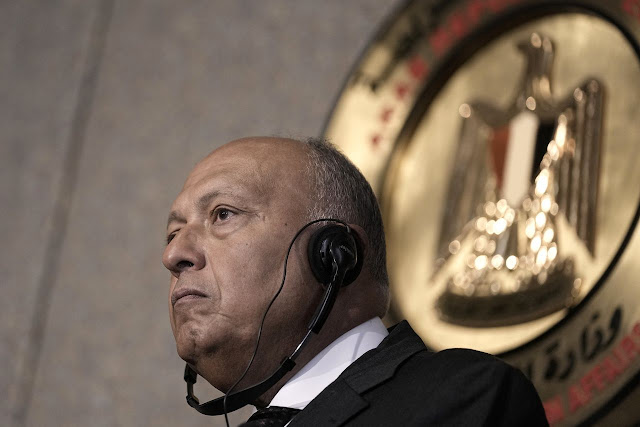**Egyptian Foreign Minister Accuses Israel of Blocking Rafah Border Crossing**
*By Lucas Lilieholm, CNN*
*Published on October 16, 2023*
*original CNN article: Here
In a joint press conference with his French counterpart, Egyptian Foreign Minister Sameh Shoukry expressed his frustration over the lack of progress in reopening the Rafah border crossing between Egypt and Gaza. Shoukry placed the blame squarely on Israel for the continued closure of the vital passage.
"The Israeli government has not yet taken a position that would allow the crossing to be opened from the Gaza side, allowing the entry of aid or the exit of citizens from third countries," Shoukry stated.
Egypt has been advocating for the swift reopening of the Rafah crossing, emphasizing its commitment to humanitarian efforts and standing ready to facilitate the flow of aid. Shoukry revealed that a significant amount of humanitarian aid had been gathered in El-Arish, highlighting the urgent need to allow it to reach its destination.
Compounding the crisis, five empty United Nations petrol trucks are currently stationed on the Gazan side of the Rafah crossing, awaiting permission to enter Egypt for refueling. A Palestinian official responsible for the Rafah crossing shared this information with CNN, underscoring the practical consequences of the ongoing border closure.
However, the Israeli prime minister's office contradicted these claims, stating on Monday that there were no arrangements or plans in place for the reopening of the Rafah border. This dissonance in statements further exacerbates the tension surrounding the situation.
The Rafah border crossing has long been a point of contention between Egypt, Israel, and the Palestinian territories. This dispute has taken on even greater significance in recent times, with the escalation of conflict and humanitarian needs in the Gaza Strip.
Efforts to resolve this situation remain in a state of impasse, and the international community is watching closely to see how these diplomatic tensions will unfold. The ability to reopen the Rafah border crossing is critical for humanitarian aid efforts and for the residents of Gaza, whose access to essential resources hangs in the balance.

